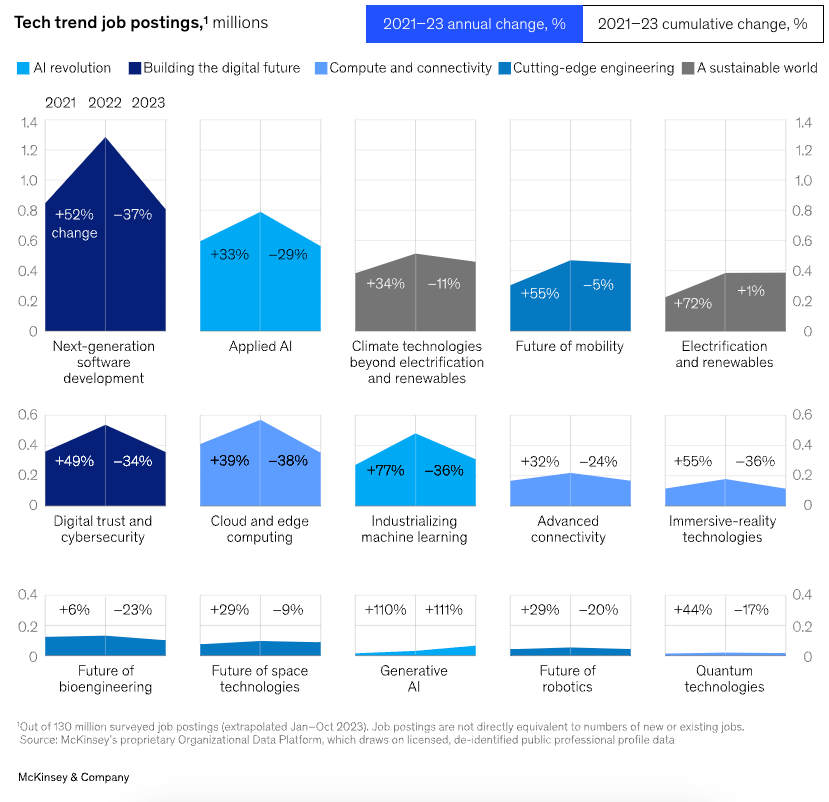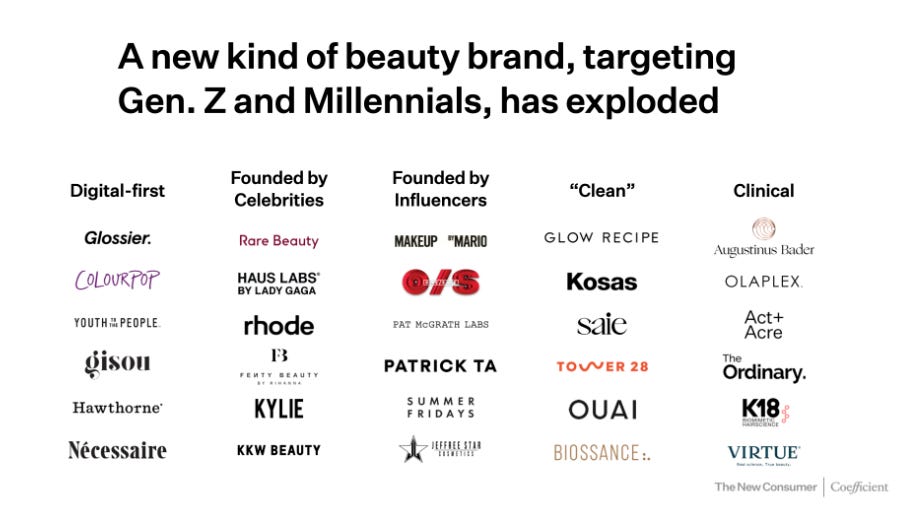(#85) on Nike's challenges - part II; Search GPT from OpenAI; Revolut is officially "the Navy"
CVS believes AI is capable of addressing your prescription inquiries
Strategy
on Nike (part II)

For the first time since I’ve been writing this newsletter I’ve felt that I did not do my best covering Nike’s challenges and here is another try:
1/ Nike is -30% Year-To-Date, erasing more than $60bn in market capitalization.
2/ A former Nike branding executive (ie. Massimo Giunco) has criticized three pivotal decisions made in 2020 under CEO John Donahue, blaming them for subsequent setbacks.
Firstly, Nike eliminated its traditional categories like running, basketball, and soccer, grouping products instead into “Women,” “Men,” and “Kids.” This change, advised by McKinsey, aimed to leverage direct-to-consumer (DTC) data for product decisions, resulting in the dismissal of many seasoned category experts. The move backfired, leading to a quiet reinstatement of categories by the end of 2023.
Secondly, Nike ended relationships with numerous wholesale partners, focusing on its own website. This strategy seemed beneficial during COVID-19 but proved detrimental as customers returned to physical stores, leading to lost shelf space for emerging brands like On and Hoka. Additionally, the absence of retailer feedback led to inventory issues.
Lastly, Nike shifted its marketing budget from brand advertising to digital marketing aimed at existing customers. This reduced the creation of new demand, slowing sales. Massimo Giunco, a former executive, criticized this move as an "impressive waste of money."
These decisions resulted in Nike's DTC business growing to 44% of sales, up from 30%, but at the cost of brand perception and market position. Giunco believes a return to strong marketing could help Nike recover. Business Insider, Massimo Giunco
Eric Seufert critiques the (viral) analysis from Massimo Giunco, challenging several key points.
Firstly, the analysis unfairly blames direct response marketing for Nike's challenges, ignoring other factors like weak demand in China. Seufert argues that direct response marketing and brand-building are not mutually exclusive and should be part of a comprehensive performance marketing strategy. He also questions the assumption that Nike's brand marketing was optimal before the shift to direct response, noting the lack of measurement infrastructure to evaluate direct response contributions accurately.
Secondly, the post broadly attributes Nike’s struggles to marketing failures, including product development issues, which Seufert sees as an oversimplification. He highlights the difficulty of proving the counterfactual and criticizes the assumption that both brand marketing and direct response marketing, when employed, are always executed flawlessly and are mutually exclusive.

SearchGPT Prototype from OpenAI
OpenAI announced a search product targeting directly Google search; by the way, Alphabet made more than $300 billion in revenue in 2023. The overall search market is over $1 trillion.
The SearchGPT Prototype represents a significant advancement in AI-driven search technology, combining the strengths of AI models with real-time web information to provide fast, accurate, and timely answers to user queries. By integrating conversational capabilities and up-to-date data from the web, SearchGPT aims to streamline the search process, making it more efficient and user-friendly. Users can expect to receive direct responses with clear links to relevant sources, and the ability to ask follow-up questions conversationally, enhancing the overall search experience.
Moreover, the prototype emphasizes a commitment to supporting publishers and creators by ensuring their content is prominently cited and linked within search results. This symbiotic relationship aims to respect and protect journalism while providing high-quality information to users. The collaboration with publishers allows for continuous feedback and improvement of the SearchGPT features, ensuring that the technology not only benefits users but also contributes to a thriving ecosystem of content creators. This prototype phase is crucial for refining the integration of AI in search and paving the way for future advancements in how people navigate and engage with information online. OpenAI, Bloomberg
Revolut receives a banking license in the UK
I named Revolut “the Navy” in my Newsletter #81 and this recognition in the UK cements that. Before that, Revolut had a banking license from Lithuania.
The full saga went like this:
1/ Revolut has faced delays in obtaining a full UK banking license due to several challenges. These included convincing regulators that it had resolved accounting issues, regulatory breaches within the EU, and concerns about its corporate culture, which was perceived as overly aggressive. Additionally, the UK's Financial Conduct Authority investigated the company in 2016 over alleged failures in money-laundering checks, although this investigation was closed in 2017.
2/ The company has taken steps to comply with anti-money laundering and terrorist financing regulations and has worked to improve its working environment. Concerns were also raised by the consumer group Which? regarding Revolut's handling of scam victim reimbursements.
3/ Revolut's founder, Nik Storonsky, has criticized the UK's regulatory process as overly bureaucratic and has considered listing the company in the US instead. Despite these challenges, obtaining the banking license is crucial for Revolut's growth, enabling it to hold customer deposits and offer loans and mortgages under its brand, though it will face stricter regulations.
4/ The mobilization period, where the company builds up its banking operations, is ongoing, and while securing a full license is likely, it is not guaranteed. This period can take several months to a year, during which Revolut must address any remaining regulatory requirements.
5/ Approval from UK regulators could influence other countries, such as the US, to grant similar licenses. The recent license approval comes as Revolut reported record annual profits for 2023 and signaled its readiness for a potential initial public offering. LINK
6/ Financial Times: “The licence will help support a valuation that could reach up to $45bn if Revolut can pull off a planned sale of existing shares — something that would make it a contender for the title of the UK’s third-most-valuable bank.” LINK
“Inside the 78 minutes that took down millions of Windows machines”, by The Verge
Photo by Diego Radames/Anadolu via Getty Images, via The Verge
Here is the entire film briefly explained:
A faulty CrowdStrike update released on July 19th caused millions of Windows machines to crash worldwide, affecting banks, airlines, and businesses.
The CrowdStrike Falcon software, which operates at the kernel level of Windows, introduced a memory corruption issue, leading to widespread system failures. Microsoft wanted to restrict access to its kernel in the past, but the EU opposed it. LINK
The update caused immediate issues such as Blue Screen of Death (BSOD) errors, grounding flights, disrupting hospital systems, and halting broadcasts.
CrowdStrike identified the issue and released a fix within 78 minutes, but the damage required extensive manual intervention to resolve.
The incident is attributed to a dormant bug in the Falcon driver that was not properly validating data, leading to the catastrophic update failure.
Lessons learned: The disaster highlighted the importance of gradual update rollouts and rigorous testing to detect and resolve issues before widespread deployment. LINK
Artificial intelligence
CVS believes AI is capable of addressing your prescription inquiries
“Instead, you will just say what you are calling about, and AI will respond if it can answer the question,” [...] “If it can’t, AI will immediately put you through to a live agent.”
He added that the company also plans to rollout a new app later this year that is designed for self-service, eliminating the need for most customers to reach out to a pharmacist or call center.” - LINK
Chat GPT adoption in Denmark
“Abstract:
We study the adoption of ChatGPT, the icon of Generative AI, using a large-scale
survey experiment linked to comprehensive register data in Denmark. Surveying
100,000 workers from 11 exposed occupations, we document that ChatGPT is
widespread, but substantial inequalities have emerged. Women are 20 percentage
points less likely to have used the tool. Furthermore, despite its potential to lift
workers with less expertise, users of ChatGPT earned more already before its arrival.
Workers see a substantial productivity potential in ChatGPT but are often hindered
by employer restrictions and the need for training. Informing workers about expert
assessments of ChatGPT shifts workers’ beliefs but has limited impacts on actual adoption.” LINK
AI is Now Shovel Ready, by Sequoia Capital
“AI will catalyze an energy transformation. New solar construction, battery innovation, a resurgence in nuclear energy—these will be long-term effects of the AI wave
Some hyperscalers will find that they are not agile enough to address rapidly changing data center requirements—new industrial AI players will emerge to fill this gap
Starting in the next 6 months, there will be a lot of headlines about delays in data center builds due to issues with liquid cooling, cluster size, and power access
The industrial capacity needed to build new AI data centers will serve as an economic stimulus and create jobs in the real economy: Steel, energy, trucking, and construction
When new data center capacity comes online, the cost of training and inference delivered by AWS, Azur, and GCP will go down, to the benefit of startups”. LINK
Things Happen
[Academic paper] How Japan developed. LINK
(Rich) South Koreans consider the Moncler jackets like mandatory uniforms in schools. LINK
Lime is piloting two new e-bikes to attract women and older people. LINK
The new Disney+, Hulu, and Max bundle for $16.99. LINK
Ming-Chi Kuo, an Apple analyst, predicts that Apple will launch an iPhone ultra-slim next year. LINK
“The Death of SaaS. How AI will rewrite the rules of software, again” - by Aki Ranin. LINK
Boeing has a new CEO. The former one was an accountant. LINK
Google’s Economic Impact in the UK (2023). LINK
Donald Trump endorses Bitcoin. LINK
Data
McKinsey Technology Trends Outlook 2024. LINK
Dan Frommer’s latest consumer trends report (mid-year). LINK
Ethiopia has 70,000 electric vehicles but only 50 charging stations across the entire country. LINK
Bookings via online platforms rise by 28.3% in Q1 2024. LINK
Outside interest
Researchers make a groundbreaking DNA discovery that may lead to a cure for pancreatic cancer. LINK
Colombia faces a new problem: too much cocaine. LINK
Independent tailors in Paris uncover a unique opportunity. LINK
The Economist made a simulator to calculate how much it would take to read the best books ever written. LINK
Everything you wanted to know about the 155mm shells and more. LINK
Thank you for being an onStrategy reader!
Interesting newsletters 💡
Work with me
🧑🏻💻 Each year I do a presentation on what's coming next: business, tech, and (new) business models.
This year I focus on the generative AI implications, the new disruptors, aggregators, the macro environment...and more. (80 slides + Q&A, 1h 30 min)
Write me at contact@onstrategy.eu












